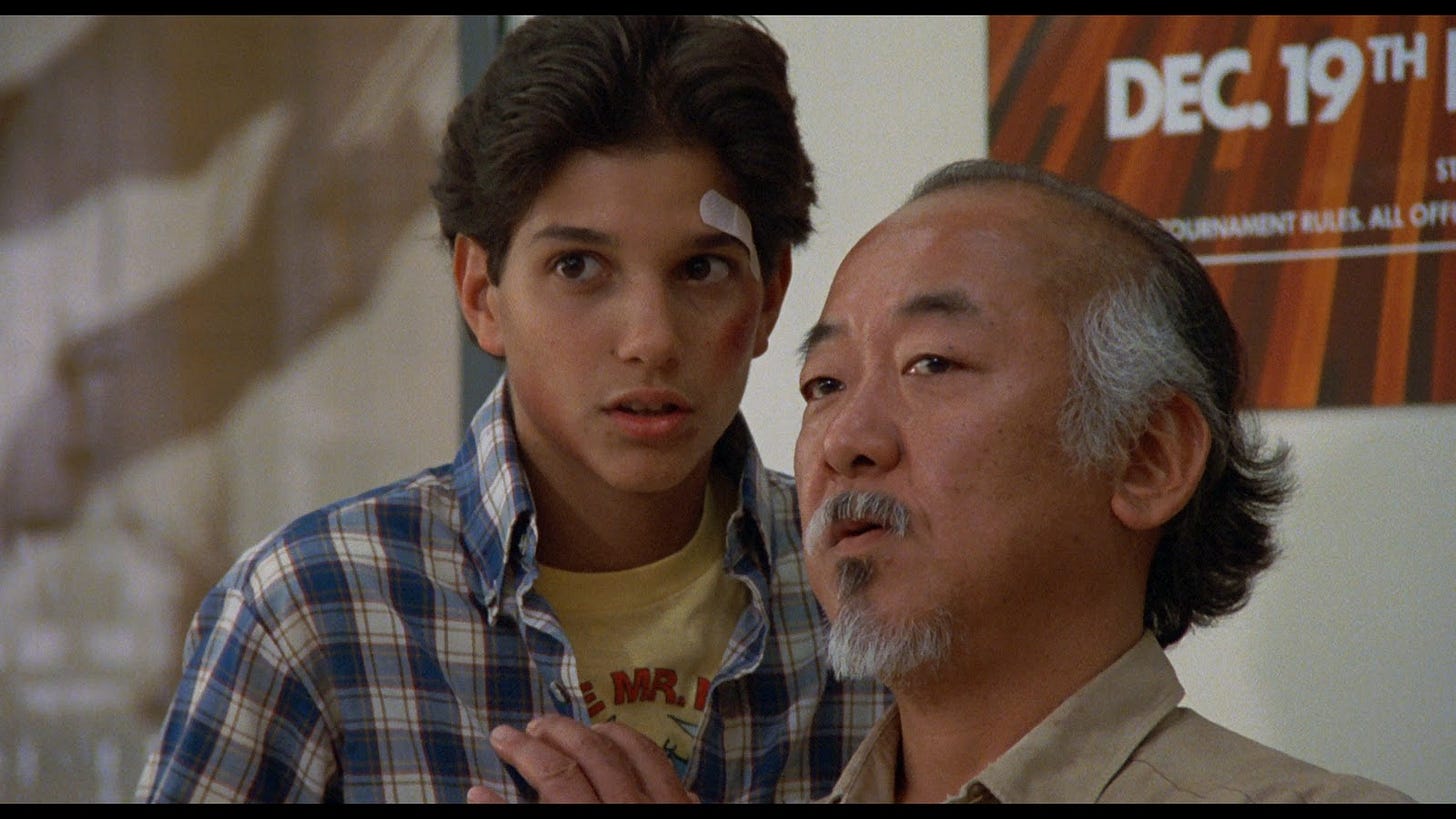Warning: This article contains language and quotations that are much darker than that which you might normally find in my column. You have been warned.
The Concerts
Allow me to regale you with a tale of four concerts:
Over the course of five years, I got the treat of nearly-free tickets to impossible-to-see concerts by two of the world’s best singer-songwriters.
Singer-songwriters are as rare in the world as writer-directors—just because one has an amazing emotive vocal range doesn’t mean one has the poetic or musical chops to carve out a sacred space of musical brilliance.
Getting to see Neil Diamond on his 1993 world tour was a chance to see, in concert, a man who not only had been able to hold sway over crowds of tens of thousands of rabid fans in an era before Jumbotron video screens, but who was also responsible for dozens upon dozens of Top 40 hits recorded by other artists.
Like Linda Ronstadt, Leonard Cohen, Scott Joplin, Fats Waller, George Gershwin, Al Sherman, Paul Simon, and Jim Steinman, his songs were covered by groups across the decades and and across genres.
If you’re under 45, you may not have heard of Neil Diamond the singer, but you have heard the music of Neil Diamond the songwriter.1
In 1993 he was on the wrong side of fifty and starting to lose his voice from the chain smoking and the vocal surgeries, but there was no mistaking the vital energy and commitment to the art which allowed this consummate showman to hold an entire, packed arena in thrall from the tiny theater-in-the-round revolving stage on the floor of the Oakland Coliseum basketball arena. He’s only recently retired from touring, and his final concerts, while more sedate due to his Parkinson’s disease and raspy voice and advanced age, were no less engaging.
A few years later, I returned to the Coliseum, this time to the stadium side, to see U2 at the height of their powers. Between the ZooTV tour in 1992 and their All That You Can’t Leave Behind album and tour in 2001, they sat on top of everything—consistently the top concert draw in the world, the top performing albums, and some of the best music on offer, much to the frustration of a lot of rock’n’roll aficionados who found their brand of political earnestness vaguely annoying. They built their public image in the 1980s with unrelentingly brutal lyricism punctuated by moments-from-the-stage where their should’ve-been-a-preacher front man would admonish the audience about the evils of war, the goodness of Jesus, and the poisons of racism and imperialism.
By the late 1980s, the routine was starting to wear thin, and they went out on top—their over-earnest (but utterly compelling) Rattle’n’Hum tour ended with the band walking off stage to “dream it all up again.”
When they returned a couple years later, it was with a grungy, erotic, nihilistic sound that took irony to stratospheric levels. The band that had preached for a decade against the evils of propaganda and consumerism came on stage doing Nazi salutes in front of a wall of televisions, throwing condoms into the crowd, with cars hanging from the ceiling, and had skits involving heroin doping, exotic dancing, and culminating with a preacher coming on stage who morphed over the course of the two-album tour into Satan himself admonishing the crowd to embrace money, meaningless, sex, power, vanity, and the surveillance state, because hey, the world was ending and democracy prevailed.
The irony was so thick you needed a chainsaw to cut through it, and in the midst of this artifice of theatricality built upon C.S. Lewis’s The Screwtape Letters, Jonathan Swift’s A Modest Proposal, John Bunyan’s The Pilgrim’s Progress, and the art house films of Wim Wenders, the band did the best work of their career. They turned their public presence into the journey of a hero walking through hell, being corrupted, and finding answers within his own contradictions. The four-album journey has an operatic spread, a masterful narrative arc of desperation leading to maturity.
And I got to catch Act 3, the Popmart tour. Steeped in ironic consumerism and decadence, it took the cynicism of ZooTV (which covered the previous 2 albums) and ripped off the scabs to show the roaring, screeching pain beneath the irony. This was the band at the height of their artistic powers, and while the follow-up album would be a nearly perfect swan song to the quadrilogy of albums, nothing they ever did after would approach the perfection of their late 90s stage show.
It was fucking glorious.
While the multimedia-saturated phantasmagorical style could not have been more different than the stripped-down personality of what I’d experienced a few years before and a mere four hundred yards away, I was reminded, happily, of the Neil Diamond. I was in the hands of masters, and being shown the truth of something very human in a beautiful, unbearable way.
And, in retrospect, I’m very glad I got to see it, because just a couple years later, U2 basically disappeared as an artistic force in the world.
The other two concerts I didn’t get to see in person.
Stand-up Comedy king George Carlin hit gold in his career talking about “those little things we all share,” especially the creeping feelings everyone has that they sense something wrong or weird, but nobody else seems to notice. On the lighter end he performed routines about the ways people lose their keys, use magical language, and commit social faux pas, and on the darker end he showed people their dark desires to avoid responsibility, take pleasure in the suffering of others, and passively allow cult leaders, politicos, and monsters to run their lives.
His final recorded concert, given shortly before his death at the age of 71, was marred by his decrepitude and low energy, but his rhetorical prowess and commitment to the material was undiminished. It’s Bad for Ya was the last hilariously hectoring grumpfest by a famously hectoring grump, and it didn’t disappoint. Carlin never lost his edge, right up to the end.
The fourth concert in my trip down memory lane is the recent Jimmy Carr entry, Natural Born Killer. Carr has the distinction of being perhaps the darkest comedian of the current age. Working almost entirely within the genre of the one-liner, he does a lot of language play. Some of it is light and fun, like his attempt to write the shortest joke in the world, starting with a four word joke (“Venison’s dear, isn’t it?” [“dear” is a British synonym for “expensive]), moving to a three word joke (“Stationary store moves!”) and culminating in a two word joke (“DWARF SHORTAGE!!!!”). In the moderately offensive department (and I’m realizing I am using the term “moderate” flexibly), he once informed his audience that “You can how a woman feels about you by looking at her feet. If they’re behind her ears, she likes you.”
From there, his humor skews dark-ish, such as when he did a bit about Joseph Fritzl, the Austrian who built an underground bunker in which he trapped his daughter and kept her as a sex slave and brood mare for a harem made up entirely of his own descendants. Carr quipped: “Here’s how middle-class I am: when I heard about Fritzl’s DIY bunker, my immediate thought was ‘I bet he didn’t get planning permission for that.’”
From there, his material gets very dark indeed, from jokes about the Holocaust (“If treating someone mean will make you love them, then why don’t the Jews adore the Germans?”) to pedophilia (“I think you know that your girlfriend is too young if you have to make the airplane noise to get your cock in her mouth”) to jokes even I am not comfortable repeating in public (which is saying a LOT).
Carr’s humor works, and always has worked, for the same reason that Carlin’s dark humor worked: He shows the audience, over and over, how their own self-satisfaction is part-and-parcel of all the things in the world they claim to detest. It holds up the kind of mirror that gives the audience a relief from the private observations and suspicions that they’re not allowed to voice to in polite company.
But, unlike with Carlin, something happened to Jimmy on the way to superstardom. It showed up around the edges in his previous His Dark Materials concert, but in his latest entry it’s on full display. Instead of an hour or two of dark observations, funny plays on language, and verbal sparring with the audience, Jimmy turned into a preacher of the blandest sort.
In Natural Born Killer, the jokes are much softer, and much less funny. He devoted ten minutes of the hour to defending his dark brand of humor (the latest variation on what was once a confrontational and ironic routine that lasted two or three minutes), then he spent fully the final third of the concert unironically giving the audience an education in the dogma of affirmative verbal consent2 using language which, while explicit, wouldn’t have done more than raise an eyebrow in a modern-day sexual education class.
In short, while Carr has always been a person of entirely conventional politics and morality, and the moral thrust of his art has always reflected this, the delivery vehicle he constructs has been edgy, confrontational, self-effacing, shocking, and arresting. The latest concert was a disappointment.
Unfortunately Carr, like U2 before him, has lost the edge.
It’s not the first time I’ve seen this dynamic play out, and it won’t be the last, but as I sorted out my thoughts after watching Carr’s concert last week, I noticed something:
What’s happened to Jimmy Carr is exactly what has happened to Western Civilization.
The Edge
When one talks about “edgy” artists, it’s often in the context of art that is somehow offensive and discomfiting, but “edgy” doesn’t exactly mean this.
The glory of great artists is that they have the ability to tell the truth in ways that, while they may be off-putting and uncomfortable as much as they are beautiful and uplifting, are impossible to ignore the moment one engages with the material. Their work cuts through the clouds of distraction and rationalization that we surround ourselves with, often brutally.
Edges are for cutting tools. A culture, a civilization, a business, a competitor, or an artist/artwork that has “an edge” is one that works with confidence and direction, carving its place out of the world. The edge is a purposefulness and a willingness to take risks. It is, in other words, a conqueror’s mindset.
Living systems exist only and always in one of two states: growth, and decay. A living thing that is growing is one that is either expanding outwards to claim more of the world as its own, or is extending longitudinally so that it will continue to endure, to exercise power and influence, long into the future.
When you have children, you’re engaging in an act of conquest. Your genes and your culture (if you’re actually the kind of person who parents their children instead of either abandoning them or trying to make them into your Mini-Mes) will outlast you and will play some kind of role in the future unfolding of the universe.
For artists, inventors, and entrepreneurs, their progeny doesn’t just consist of their children. It also consists of their customers, fans, and the societies within which their innovations find a place.
Whether the conqueror is a monster (Genghis Khan killed forty million people—a tenth of the world’s population-at-the-time) or a benefactor (George Washington changed the course of the world by doing his duty when he did not have much desire for the notoriety it would bring) or a mercenary (Leonardo da Vinci got himself a cushy patronage so he could play with the things that interested him), the effect is the same. With all life forms—animals, people, ecologies, economies, religions, nations, and civilizations—that which cuts through the world is that which survives.
This is “the edge.”
When living things lose their edge, they change from a state of growth to a state of decay.
U2 lost its edge when its members accrued enough political power and could no longer play the role of “rebel critic.” In becoming “respectable” they ceased to be relevant—but that characterization is not entirely fair to what actually happened. The kind of art that U2 did at their best was only possible when it came from someone (or a group of someones) who understood the difference between artifice (the root word of both “art” and “artificial”) and truth.
The musician Sting once took a sledgehammer to parasociality with his song Nothing Bout Me.
The members of U2, on the other hand, committed the cardinal artistic sin:
They started believing their own PR.
The image they worked to cultivate in the minds of their audience supplanted their self-images,3 as is very clear from some of the more obscure writings about the group to which I’ve been privileged to have access. Somewhere along the line, they lost the ability to distinguish between themselves and their product—and in the arts, this always presages failure, because the product is for others even if the artist does his art to gratify himself (or fill his bank account).
Why does someone start believing their own PR (aside from rampant egomania, which is often—though not always—a factor)?
Fear.
Specifically, the fear of loss.
Karate for “Defense” Only
The 1984 film The Karate Kid introduced the mentor character of Mr. Miyagi, who agrees to tutor Daniel LaRusso, the bullied hero, in the ways of martial arts so that he might have the strength to fight for the right to be left alone—but only after securing the boy-hero’s promise that Daniel understood and believed Miyagi’s core belief about violence: it is for defense only.
The film (and its first sequel),4 then follows our hero’s journey as he grows strong and skilled enough to defend the things he cares about so that those things might then have the room to grow unmolested.
The “defense,” in other words, is an acute condition in which the hero is forced to turn his mind from his normal business of life (and the growth that implies) to violence in order to further that initial growth. Once the season of defending is over, the hero returns to the business of conquering life in the way he prefers.
Notice, though, the mutual exclusivity implied: one cannot both defend and conquer. The choice is binary, because either path requires full commitment.
When one lives in fear—especially the fear of losing that which one values—one may decide to fight back for a season, as did The Karate Kid. But, more commonly, one may choose to center one’s live around preserving that which one cares for.
In other words, one may defend, or one may live defensively.
When Daniel LaRusso “defended” himself (and, in the second film, the woman he loved), he was not defensive. He stood, and he fought. He wanted something tangible, and he was willing to risk humiliation and injury (in the first film) and death (in its sequel) to achieve it. In this sense, Daniel was not a defender. He was a conqueror.
Miyagi would have been wiser to say that he believed “Karate for response only.”
Compare that attitude to the scholarly conservatism of the Jedi in the Star Wars Prequel Trilogy.5 The Jedi know there is a threat against them brewing. They keep running into Sith, they are told point-blank that the Sith have amassed great political influence.
They know of the ancient vendetta that the Sith are pursuing to wipe the Jedi from the galaxy. In response, they concentrate on prudence and purity-of-heart, on building higher the walls of their dogmatic conservatism, because to fight on their own behalf would be to embrace the conquering mindset of the Sith.
One is left to wonder, at the end of the trilogy, how the Jedi ever achieved spiritual dominance in the first place, because what we see of the Jedi is corrupt, self-involved, and utterly contemptible—not because they have “lost their way” as Jedi, but because they have become too good at defending themselves and their beliefs. They are a dying people, and the only one among them (Qui-Gon Jinn) who understands this and attempts to reverse the decline is summarily locked out of any position of influence.
The “heroes” in the Harry Potter series exhibit the same kind of idiotic defensiveness, which is why they’re only able to finally defeat Voldemort through an act of divine intervention.
This, by the way, is why conservatives always lose. They police the boundaries of their communities and dogmas so effectively that the things which they value can not grow because they have no room to grow. The conservative parent who keeps his or her child locked up to protect them from the world is choosing a life for that child that precludes the child ever attaining adulthood, unless the child chooses to use violence in order to shake off the parental tyranny. If the cage is well-gilded, the subject will instead adopt a habitual defensive posture, and spend his or her life trying to make sure they can not lose—which guarantees that they can never win.
It may be ironic, then, that in our political culture which divides itself between “right-wing conservatives” and “progressive liberals,” the left-wing parties are often as conservative or more conservative than at least some parts of the right wing. “Conservatism,” contrary to the popular language, knows no political allegiance. It is, instead, a psychological orientation. A conservative is a person whose primary concern is defending his culture and power (and the things secured by them). That’s it.
How the West Was Lost
So now we come to the heart of the matter.
Cultures grow exactly as well as they are able to conquer. That conquest may come through force of arms, it may come through propaganda, it may come through demographic strength, but the victories secured are only ever maintained so long as that culture also employs another, very ancient, mode of conquest:
Seduction.
In any marriage, the marriage dies a little bit the first time one partner says to the other “but you promised.” Add enough of such moments together, and the marriage dies entirely.
The hell of it is, statement may be true on its face, but the very fact that it needs to be said indicates that the reasons that the partnership was viable have already fallen away. What’s left is obligation for obligation’s sake—and, while that may be powerful enough to keep a couple together for the kids, or for financial reasons, it will never revive the intimate and dynamic relationship that gave birth to the partnership in the first place.
Nobody needs to be reminded of a baseline obligation when their interests and values line up with it. They only need to be reminded after they have already defected. Marriages that reach this state can sometimes be renewed, but they don’t get renewed because the couple goes to counseling, or decides to “do the right thing.” They get renewed because the defecting party decides that he or she wants to engage in the risky proposition of re-tasking the stale, unfulfilling, conservative, and dying relationship towards conquest.
The relationship exists because shared risk creates bonds between people. It persists (as a living thing) because the couple shares risks in pursuit of goals that are good for the team. It dies as soon as one or another party starts playing defense against the other (even for good reasons), and tries to extract the benefits of the partnership without vulnerability to the shared risk associated with it.
The Post-WW2 order in the West, and the culture that was built on top of it, was based on seduction. America said to the world “We will risk our economy to make you prosperous, and in return you will risk your lives to contain the Soviets—and we’ll help you do it.” When a US ally stepped out of line during the Cold War, there were consequences for that behavior—sometimes economic, sometimes martial—but the power of American seduction was never far from the minds of all parties involved.
Or, as Mamet said through the mouth of Capone in The Untouchables (1987):
“You can get farther with a kind word and a gun than you can with just a kind word.”
Along the way, America began to believe its own PR: We are a benevolent people. We’re in this game to save the world, not for our own benefit. People don’t just want security, all humans from all cultures really do want our style of freedom. We must always prove that we are who we say we are.
Britain, too, believed its own PR about being a benevolent empire. It was because of this belief that they did not assassinate Ghandi when it might have saved their empire and hurt the Nazis (who were close allies of Ghandi). Ghandi, after all, cunningly spotted that all he had to do in order to end the then-most-powerful empire in history was to “hold it to its own standards.”
This playbook was happily adopted by communists in the West, who, like Ghandi, were not interested in being benign and benevolent, but were interested in emotionally blackmailing their gullible moralistic, narcissistic, and self-satisfied opponents into ceding ground that could not be regained.
With the “non-violent” propaganda-maximizing activism strategies (which weren’t all that non-violent, in the end) developed by Ghandi—and used later by Martin Luther King and all manner of activists since—the West’s Achilles’ heel was exposed. The moral superiority of pacifistically-minded Christians (and those from Christian cultures) was the perfect vector to induce the entire civilization to play perpetual defense.
By the 2000s, the West no longer sought to grow its culture longitudinally (that would be perpetuating colonialism!). It no longer sought to grow organically through seductive conquest (our way is the right way, and if we bomb countries into submission we will liberate their people’s natural moral sense from their overlords!). The West had turned entirely inward, attempting to stop the long-running erosion of its mythical moral society—a society that, despite its well-burnished self-image, was never chaste, nor pacificstic, nor “inclusive,” nor “respectable.” The West was instead robust, militaristic, conquering, promiscuous, happy to accept anyone who could seize their own destiny, and concerned over all things with projecting itself into the future through a strength of a culture built on individual desires which, taken on average, would tend more towards having healthy families and building robust enterprises than it would towards injecting heroine.
And, on average, this is what mammals do—addiction (of all sorts) is a side-effect of a dying culture, whether that culture is familial or religious or civic or national or ethnic. A rat given free access to cocaine and free access to friends might party with the drug from time to time, but he will choose his friends more often, and will not become an addict. Deprive that rat of friends and family, and he will prefer the cocaine even to food, and starve to death.
In this way, as in so many others, we are not so very different from our rodent cousins.
Conservatism—the desperate desire to protect one’s position, respectability, traditions, power, and certainty—leads always to the continual shrinking of one’s sphere of influence and vitality. Believing one’s own PR, forgetting how to dream up new frontiers, obsessing over one’s personal boundaries (especially when one shoves the responsibility for one’s social respect onto others), are all necessary and vital steps along the road of decadence trodden by every comedian who looses his edge, every rock star who sells out, every activist group that pursues a purity spiral, and every empire that ever falls.
Conservatism is the death of human meaning.
And it is the fatal blow to every civilization.
If you found this essay helpful or interesting, you may enjoy the Reconnecting with History installment on Understanding Before Thinking, and this essay on learning to think through language and story: Are You Fluent in English?
When not haunting your Substack client, I write novels, literary studies, and how-to books. You can find everything currently in print here, and if you’re feeling adventurous click here to find a ridiculous number of fiction and nonfiction podcasts for which I will eventually have to accept responsibility.
Thank you again for your continued support, which allows me to write articles like this and has recently, literally, saved my life. If you’re not currently a subscriber or supporter, please consider doing so now.
Some of the more universally known include Sweet Carloine, I’m a Believer, Red, Red Wine
i.e. Asking and receiving verbal permission for every single move in the intimacy dance.
This is, by the way, why public intellectuals—at whatever scale—so often slip over the line into becoming cult leaders.
I am ignoring the other sequels, including the Netflix series Kobra Kai, because they actually subvert the point I’m going to be talking about here—they lost their edge for the same reason that Carr and U2 did.
I almost used Lord of the Rings for this, but I’ve got two essays on Lord of the Rings coming up soon so I didn’t want to wear out my Tolkeinian welcome.









On another note, I'm a big fan of traditionalist (where it worked) living and learning, but I'll always be the one everyone calls crazy because I don't think a continuation of bad traditions or isolating traditions are good. Basically, I'm not really welcome in southern churches because I like to ask questions. I still pray daily, but not in those places.
My favorite U2 song is "Stuck in a moment" from their 2000 album. I agree with you, though. When they started to suck, they really went all in.